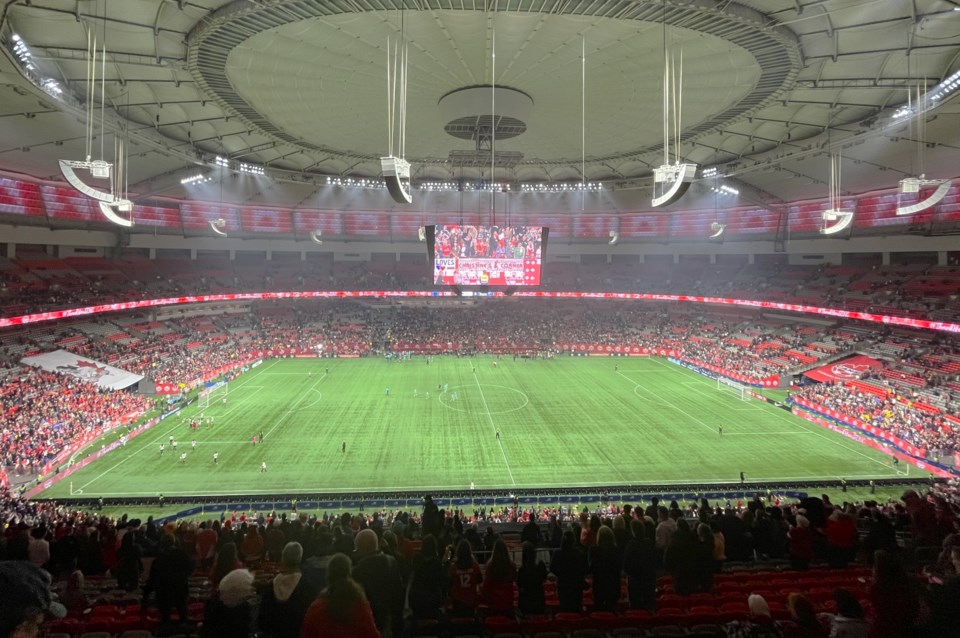FIFA chose to reveal the men’s 2026 World Cup schedule on the Sunday between the National Football League conference championships and Super Bowl LVIII, clashing with the early stages of the Pro Bowl Games telecast.
A B.C. marketing expert said after the May 2023 unveiling of the FIFA World Cup 26 logo that soccer’s governing body was aiming to compete head-to-head with the NFL for fans and sponsors.
“These guys clearly have aspirations,” said Lindsay Meredith, professor emeritus of marketing with Simon Fraser University. “Frankly, they're in a good position to pull it off, which is basically to supplant Super Bowl as the superpower sporting event.”
The FIFA 26 logo contains the gold trophy awarded every four years to soccer’s world champion.
FIFA estimated a global viewing audience of 1.5 billion for the 2022 World Cup final in Qatar between Argentina and France, including nearly 26 million in the U.S. Meanwhile, Super Bowl LVII drew more than 115 million viewers in the U.S. and reached another 40 million around the world.
Mexico hosted the 1970 and 1986 World Cups, while the U.S. played host in 1994. Canada’s biggest previous FIFA event was the 2015 Women’s World Cup, which ended at BC Place.
Canada will play in its third World Cup, after qualifying for Mexico 1986 and Qatar 2022.
The first match scheduled in Vancouver is for June 13, 2026, with four more in the group stages including two featuring the Canadian team. There will also be one game in the round of 32 and one in the round of 16.
Vancouver’s seven matches between June 13 and July 7, 2026 mean the B.C. Lions will have to start their Canadian Football League season on the road. But there are numerous other unknowns about the tournament.
Where will all the VIPs, sponsors, reporters and ticket holders stay?
Metro Vancouver has a hotel shortage, with little time to build new ones or convert empty office buildings to hotel use. Meanwhile, provincial restrictions are coming for short-term rentals. So cruise ships might be the best plan B.
How much will tickets cost?
For Qatar 2022, opening round matches ranged from US$69 to US$220. Vancouver will also host a FIFA Fan Festival big screen public watch party for all matches, tentatively set for Hastings Park. The $103.7 million, 10,000-seat PNE Amphitheatre is scheduled to open in late spring 2026.
What is the total bill for taxpayers?
Officially, the City of Vancouver is on the hook for $230 million. The provincial government gave city hall authority to collect a 2.5 percent tax on accommodations until 2030.
B.C. Pavilion Corp, which manages BC Place Stadium, has not announced its budget for a laundry list of upgrades, from two temporary grass pitches to new elevators to a souvenir store and press box. But it will be in the tens of millions of dollars.
The federal government has not announced its contribution, which will include security. Vancouverites who remember the $1 billion price tag to keep the 2010 Winter Olympics safe might brace for sticker shock.
Secrecy abounds. FIFA is resisting disclosure of its host city contract with Vancouver. Seattle city council released its agreement last summer. It says Seattle is responsible for supporting the government to provide safety, security, fire protection and medical services at no cost to FIFA, plus free public transportation to ticketholders on match days, and to anyone accredited by FIFA throughout the competition period. Unless otherwise explicitly stated, the host city authority shall be responsible to bear all the costs of hosting and waive all claims of liability against FIFA, its officials and related entities.
Is there an economic benefit?
Undoubtedly, a bonanza for some businesses. But definitely not for all.
The province estimates it will generate more than $1 billion for the tourism industry during 2026 and for the five years after the tournament.
A study on local, regional and national economic impacts of mega events by Victor Matheson, an economics professor at the College of the Holy Cross in Massachusetts, found that many large sporting events “simply supplant, rather than supplement the regular tourist economy.”
“In other words, the economic impact of a mega-event may be large in a gross sense but the net impact may be small,” Matheson concluded.




